The civil rights activist, who recently found himself at the sharp end of the presidents tweets, discusses his history with Trump and the recent mass gun violence
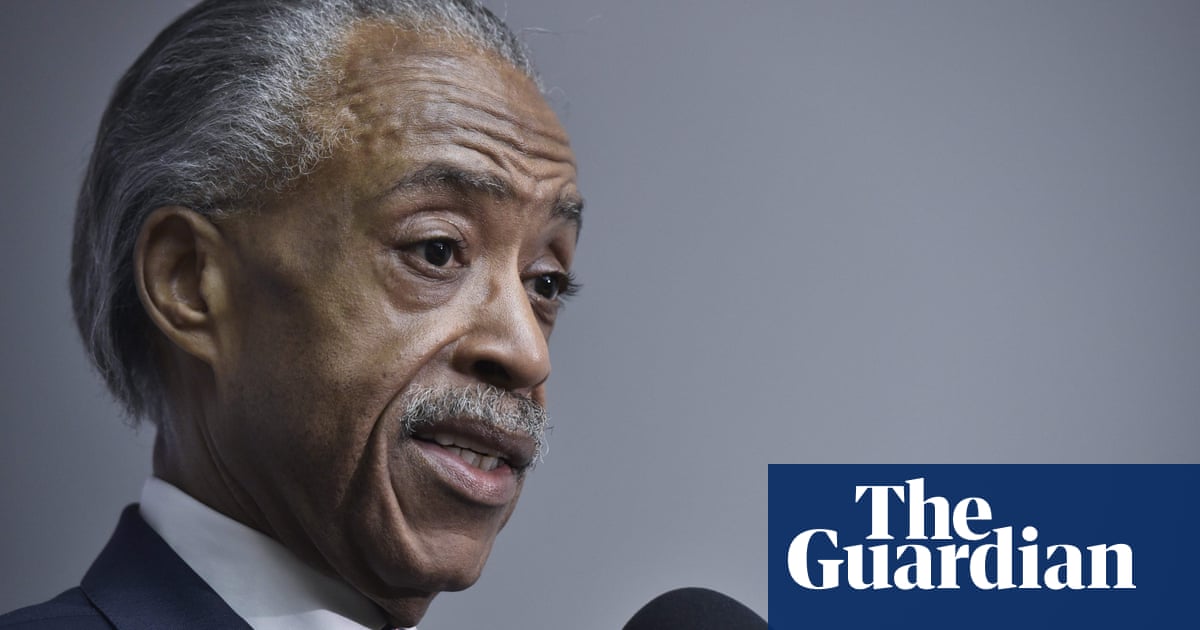
Among the many framed mementoes that clutter the white vinyl walls of the Rev Al Sharptons midtown Manhattan office, there is one he treasures just a little more than the others. Its an official program for the state memorial service held for Nelson Mandela in Johannesburg back in 2013.
Sharpton, the American civil rights stalwart, had been unable to travel to the event in person, and received a copy in the mail signed by a close friend. Across the programs gold lettering, a short message is scrawled in thin black marker: To Rev Sharpton A fellow warrior for justice! The signature is Barack Obamas, who back on that wet December day gave a speech in honor of Mandela that framed his legacy and post-apartheid reconciliation as a clarion call for global justice and peace.
Theres a degree of beleaguered nostalgia as Sharpton looks at the frame, now a relic not just of a previous presidency but a different era of politics, defined by optimism, ideas and nuance.
The Obama years thrust Sharpton, often a divisive and radical figure in American politics, further into the mainstream. It was during this time that the Baptist minister, once a direct action campaigner at the heart of some of New York Citys most torrid racial disputes, was given a primetime show on the cable news channel MSNBC and described as the White Houses informal adviser on race.
I dont care if Donald Trump does 20 tweets on me. Nothing will ever mean more to me than the first black president calling me a warrior for justice on the program of Nelson Mandela, in his own penmanship, he says, pointing to the signature.
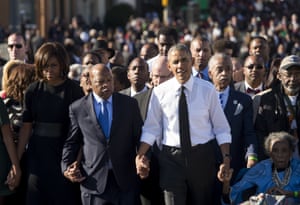
It has been less than a week since the 64-year-old preacher, born across the East River in Brooklyn, found himself at the sharp end of a typically divisive and inflammatory tweetstorm from the current president of the United States.
Last week, Trump labelled him a conman, a troublemaker who Hates Whites & Cops! as Sharpton travelled to the majority African American city of Baltimore, Maryland, which the president had earlier described as a disgusting, rat and rodent infested mess in an attack on the districts veteran black Democratic congressman Elijah Cummings.
It was just the latest salvo in Trumps culture war, which has seen a potent mixture of thinly disguised racism directed at black leaders, hardened anti-immigrant rhetoric and Islamophobic slurs.
A few days later, a 21-year-old white gunman killed 22 people in the border city of El Paso, Texas, in a domestic terror attack allegedly fueled by white nationalism and immigrant hatred.
Sharpton was shocked, but not completely surprised, when he heard the news. This country is in a very dangerous place if we do not legislatively deal with this and set a different moral tone than this president, he says, his voice rising with the crescendo and intonation you would expect of a lifelong preacher.
Since Trumps online attack, he claims, he and his civil rights group, the National Action Network, have received a substantial increase in threats.
They have probably tripled since hes come into office, and quadrupled since he tweeted about me, Sharpton says. Youve got a president of the United States saying Im a troublemaker, so what does that say to someone like the guy that shot up El Paso? Even though you hope that it doesnt lead to that, youd be foolish not to take precautions, because you dont know what nut he may wake up.
Of course, Sharpton is no stranger to volatile politics. His career as a civil rights campaigner has spanned over 30 years, and he has met his fair share of controversy and, on occasion, violence. He points to the left side of his chest, where in 1991 he was stabbed by a white resident in Brooklyn as he led a protest over the death of Yusuf Hawkins, a black 16-year-old, at the hands of a white mob.
I know what it is to be hurt. I mean, physically, Ive paid the price. But that stabbing got me past the fear of [being threatened].
Since then, Sharpton has been on the frontlines of many of Americas most notorious police brutality cases. He marched with the family of Trayvon Martin, the unarmed black teenager from Florida gunned down by a neighborhood watchman in Florida. He attended the protests in Ferguson, Missouri, after the police shooting of another unarmed black teenager, Michael Brown. He has worked on nearly every high-profile police killing in New York City for the past two decades, none more so than the chokehold death of Eric Garner, who died on Staten Island in 2014.
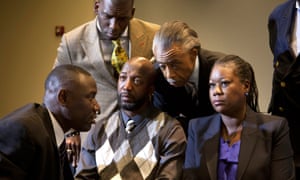
Its a bright summer morning, and Sharpton is looking typically trim, his hair slicked back, a neatly fitted shirtdisplaying the weight loss he experienced about a decade ago. He leaves the television on throughout our conversation, keeping an eye on cable news and checking his phone, which buzzes constantly.
Its a quirk he appears to share, ironically, with Trump also a cable TV addict. But their connection goes well beyond this and their recent spat. The pair have known each other for 25 years as flamboyant personalities in this citys social and political scene. Both are lifelong New Yorkers who moved from the outer boroughs to the bright lights of Manhattan, albeit under markedly different circumstances. Their paths have frequently collided.
Sharpton recalls the first time he met Trump, on a helicopter ride to Atlantic City in New Jersey, accompanied by the boxing promoter Don King in the late 1980s. King and Trump were trying to broker a deal over venue and promotion rights to Mike Tysons fights and, according to Sharpton, had met resistance from the majority black city council. They lobbied him to get involved but he declined.
I didnt even want to get on the helicopter because I didnt like Donald Trump, he says.
Sharpton went on to protest outside a Trump building in the midst of the Central Park Five scandal, in 1989, during which the real estate tycoon took out advertisements in all the citys newspapers calling for the death penalty against five teenagers falsely convicted, and years later acquitted, over the rape of a white woman in the park.
More than two decades later, in 2008, emails seen by the Guardian show that Trump called Sharpton to personally offer him a slot on The Apprentice. Sharpton declined.
He begged me and I wouldnt do it.
Trump, perhaps predictably, has characterized their relationship somewhat differently.
Went to fights with him & Don King, always got along well. He loved Trump! He would ask me for favors often, the president tweeted last week.
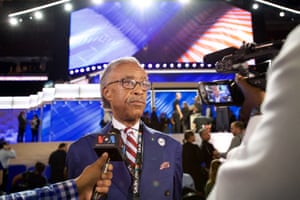
In 2002 and 2006 the billionaire appeared at Sharptons National Action Network conventions, now among the largest civil rights symposiums in America, as an invited guest. The pair posed for photos, both beaming.
Does he regret bringing him now?
I wanted to show bipartisanship, Sharpton says, striking a surprisingly defensive tone. You cant have a civil rights convention where you say Im only going to have one side, and so it was in that spirit.
But it was after the election of Obama, he says, that his assessment of Trump went from being one of a cynical manipulator of race to a white nationalist, as he led the birther conspiracy movement.
At our last sit-down meeting he argued with me about Barack Obama not being born here but being born in Kenya. If youre not one of us, youre one of them. Thats when I was convinced Thats who he is. Hes a white nationalist. This is not just some maneuver of his. He deep down inside believes that.
In the years since Obamas presidential candidacy, Sharpton has played an increasingly prominent role during the Democratic primary season. In 2016, he invited Hillary Clinton and Bernie Sanders to dine with him in Harlem, in carefully managed media events near the National Action Network headquarters. He declined to endorse either ahead of the New York primary.
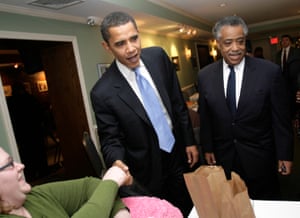
He was present for both Democratic debates in Detroit last month, and says he has spoken in depth with all of the frontrunners during the campaign. It was telling that shortly after Trumps attack, most candidates were quick to tweet their support for Sharpton, many of them describing him as a personal friend.
Hes equally coy on endorsements this time around, too, undoubtedly aware that playing it cool will lead to more courtship from the key players, eager to appeal to the African American vote, which will be crucial in the early voting state of South Carolina.
He is not shy when asked to define his own political capital, though. He lists off his now weekly cable show on MSNBC, his daily radio show, his televised weekly rallies in Harlem, and National Action Network offices around the country. All of this, he claims, is a way to tap tens if not hundreds of thousands of prime voters in black America.
My role is that I represent a constituency that rallies around these issues, he says. You can say you dont want that constituency. Or you can get to them another way. Be my guest. But we have a proven track record.
So, candidates aside, what sort of politics does he think will have a chance of beating Trump next year?
A movement of people who dont want to see a president that is the personification of white nationalism and nativism, he says. The only way the Democrats can miss it is if they have a candidate that is not courageous enough to use that issue. But if they stand up, Trump beats himself.
Read more: https://www.theguardian.com/us-news/2019/aug/10/al-sharpton-interview-trump-el-paso-obama


Recent Comments